Foreign Students whose classes move online cannot stay in US
The spread of coronavirus has led to major changes for higher education across the world, with many institutions embracing virtual tuition as a way to allow students to continue their learning.
But US immigration authorities have now said that international students whose courses move fully online this autumn could face having their visas revoked.
An advisory from US immigration authorities says that unless students switch to courses with face-to-face tuition they could be deported.
The decision has caused uncertainty and fear for the hundreds of thousands of international students who rely on student visas.
The BBC spoke to some of those affected.
‘There’s no clarity’
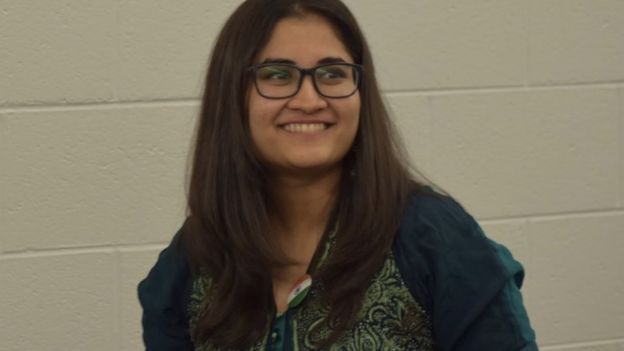 Image copyrightTANISHA MITTAL
Image copyrightTANISHA MITTALTanisha Mittal, 22, is from Mumbai in India and studying for a masters in health management and policy at the University of Michigan.
“Like many other international students, I came back home to India right before the country went into lockdown. Everything has been online since then,” she says.
“I finally booked my ticket last week to go back to the US. I woke up to this rule the next day. I was so anxious. I wasn’t sure if I would be able to go back.
“I’ve been really scared that now because of this confusing order I may be deported back from the airport. My university had said they’d go hybrid so I understood this may not affect me but I was not sure how I’d prove that to immigration officials. My flight is in 10 days, which makes the whole issue even more urgent for me.
“But there’s no clarity. There are so many categories of students and this order applies differently to each of them: students who are in the US, students who are in their home countries, new admits [admissions].
“Everyone is grappling with so many questions at this point. So basically, if your university is going online you need to go back to your country and if it is hybrid you need to go back to the US. The whole concept of personal choice has been removed and we’re literally being compelled to do something that we may not want to do.
“With Covid, it’s also unsafe because people from different countries would come back to campus. So, the risk has increased. What if cases surge and universities go fully online again? Will they ask us to go back? Will our visas be revoked? ”
‘My scholarship may be rejected’
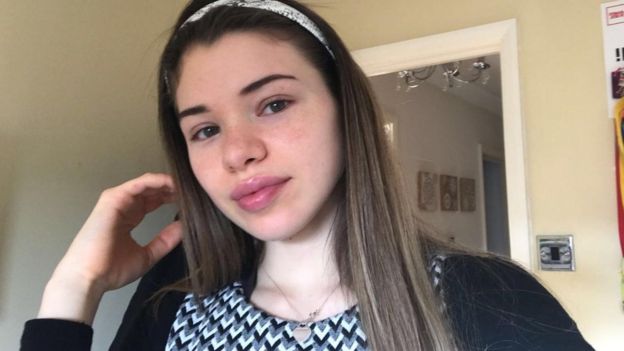 Image copyrightMOLLY CANHAM
Image copyrightMOLLY CANHAMMolly Canham, 18, is from Devon in the UK and has been offered a sports scholarship to study at Louisiana State University.
“At the moment, I live my life on the day to day, not knowing when I will be able to start university or start competing for my cross country team. I have been signed to run for the school so potentially not being able to go there in August leaves me in fear that my scholarship may be rejected.
“Currently, I cannot gain access to a visa to get to the USA, as the embassy is closed and most international students are being rejected.”
“I’m worried that my only option will be to take any major/ course which has face-to-face time just so I can get there and maintain my sports scholarship.
“I am also in contact with other athletes who are on scholarship who either cannot get back into the USA to study or are at risk from being deported back to England due to online course load.
“It makes me very anxious for the future as I do not want to be treated poorly and unfairly when I get to America. A lot of students I know are scared for the future at the moment.”
‘We came here with dreams’
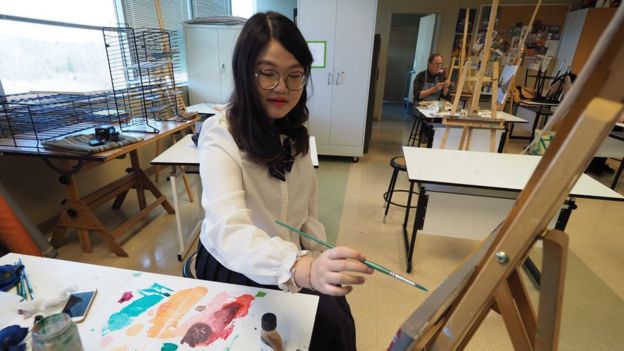 Image copyrightQINYUHUI CHEN
Image copyrightQINYUHUI CHENQinyuhui Chen is a Chinese national majoring in psychology at Penn State University and is currently in the US.
“I was pretty shocked when the announcement came out. It’s just so sudden.
“Our school has a hybrid policy for the fall and will be moving into complete online mode after Thanksgiving,” she explains, but worries about the impact this change could have on her and other students in a similar position.
“Many of my friends thought that they could take online classes for the fall and have already returned home. For those who are still here, we’re constantly keeping our eyes on the price of plane tickets.
“I think it is just not practical for us to rush back and forth between our home country and the US. I really hope that the school will maybe give us a one credit hybrid class after thanksgiving so we could stay in the US.
“I would really hope that ICE [US Immigration and Customs Enforcement] reconsider the policy. It is affecting every single international student here in America. We paid huge amounts of money and came here with dreams. For those who cannot afford the plane tickets or whose home country has a closed border, they may face deportation.”
‘The US needs international students’
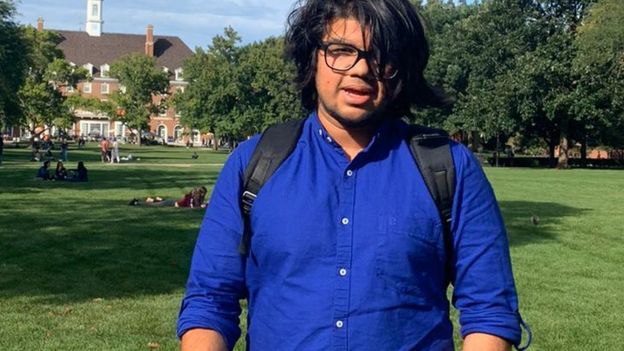
Dev Wadhwa, 19, is from Vadodara in India. He is majoring in computer sciences at University of Illinois Urbana-Champaign.
“I had admission offers from Australia, Canada and Hong Kong but I chose the US because of the quality of education,” he says.
“After the order was announced, one of my friends messaged me and said: ‘You’re going to be kicked out from the US.’ I was shocked and frustrated. It felt like a bombshell dropping on top of you.
“For the first 24 hours it was really, really frustrating for everyone. No-one knew what it meant.”
Although he later found out that his programme would not be affected, he adds that the stress for students has been difficult.
“We are already in the middle of a crisis. This was not really needed right now. It’s just sad because some students don’t have the option to go back to their home countries or to come back to the US from their home countries because of travel restrictions. So all of this is even more anxiety-inducing for them.”
But Dev says he understands the decision.
“If you look at it from the point of view of the administration, if a university is completely online you don’t need to be in the US. It’s logical, I think. But then again, the US needs international students to work for them and to keep their universities going.
‘Panicked and anxious’
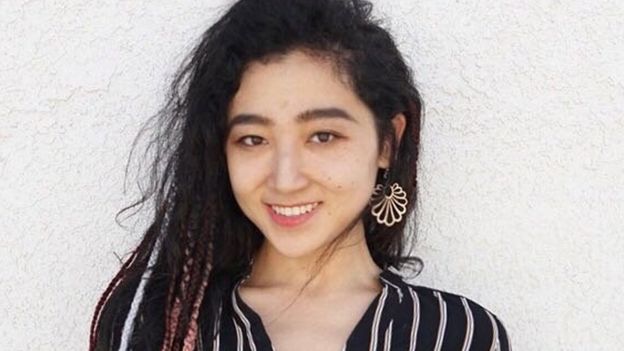 Image copyrightNOX YANG
Image copyrightNOX YANGNox Yang is a 20-year-old from China studying sociology and film at UCLA
Messages flooded into an online group for Chinese students at UCLA after the visa change was announced this week.
“Everyone was very panicked and anxious,” Nox Yang says.
Her university offers an on-site and remote hybrid curriculum, but as a student in sociology and film, Yang may face difficulty enrolling in on-site classes, as most of those currently offered for courses in science and maths.
“In the worst-case scenario, I will have to return to China, but it’s a lot of hassle,” Nox says, citing skyrocketed flight fares and quarantine requirements.
She adds that the time difference and China’s internet censorship may lead to more hurdles for remote learning.
‘It’s disappointing’
Iris Li, 20, is a junior student from China at Emory University in Atlanta but is currently in Beijing
Iris Li woke up to the news that she may not be able to renew her student visa, as she is taking only online classes from China.
The 20-year-old travelled back to her hometown Beijing, China in late March, only packing for a summer break. But her plan has been disrupted since the Covid-19 outbreak unfolded in the US, where she has lived for six years.
Iris’s visa appointment in early July was cancelled, as routine visa services in US embassies and consulates around the world remain suspended. Worse still, the ICE rule means she won’t be issued a new student visa if taking a fully online curriculum.
“It’s disappointing,” she says.
Meanwhile, Harvard University and the Massachusetts Institute of Technology (MIT) have sued the Department of Homeland Security and the federal immigration agency over new guidelines barring foreign students from remaining in America if their universities switched to online-only classes in the Fall.
A report in The Harvard Crimson said the two preeminent educational institutions filed a lawsuit in District Court in Boston on July 8 morning against the two federal agencies.
The lawsuit seeks a temporary restraining order and preliminary and permanent injunctive relief to bar the U.S. Department of Homeland Security and Immigration and Customs Enforcement from the enforcing federal guidelines that will force international students to leave the U.S.



